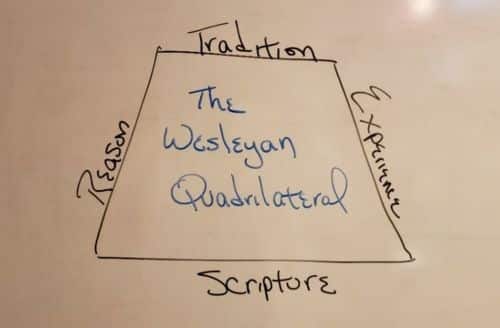I have recently been listening to a podcast while out walking, “Theology for the Rest of Us” by JR Forasteros, a pastor from a Nazarene church. One of the things that he has mentioned repeatedly is the Wesleyan Quadrilateral, an expression coined by Albert Outler, based on the teachings of John Wesley, now incorporated into the United Methodist Church’s Book of Discipline: “Wesley believed that the living core of the Christian faith was revealed in Scripture, illumined by tradition, vivified in personal experience, and confirmed by reason.”
The Four Sources of Theology
So, the Wesleyan Quadrilateral identifies four sources for our personal beliefs: Scripture, tradition, personal experience, and reason. I do believe this a good way of looking at how we develop our personal theology, although I would also add the Holy Spirit into the mix.
The Scriptures
If the Bible is not the backbone of our personal theology, then we are pretty much assured of going astray. As 2 Timothy 3:16-17 says, Scripture is inspired by God, and is useful for our spiritual journey, bringing us to maturity. If our personal theology is not well grounded in the Scriptures, then we are adrift. But the Scriptures by themselves are not really enough.
In Luke 24:13-35 is told the story of the two disciples on the road to Emmaus after Jesus’ resurrection. Jesus met up with them and began to share with them what the Scriptures had to say about himself. Surely they knew these passages already. But it is not until Jesus gave them illumination that they understand them. And that is what the Holy Spirit does for us today; taking the words on a page that anyone can read, and transforming them into the Word of God for us. Apart from the Bible and the Holy Spirit’s instruction, we cannot know God.
Tradition
But tradition, or the teachings of the church, also impact our own personal theology. The doctrine of the Trinity, for example, is not explicitly found in the Bible, although it is certainly implicitly found. The doctrine as we know it today took over 300 years to come to the point where it is today. Much of what we hold to be true concerning God and his workings in this world and our own lives has come from others who have faithfully studied God’s word, seeking a fuller understanding of God. We are indebted to them and the work they have done.
Experience
My own personal experience in the world and with God also shapes how I view the Scripture. And how I understand God and his activity in the world. It is important that I understand my experience in light of the Scripture, rather than the other way around. If I allow my experience to shape how I view Scripture, it is likely that I will develop an incorrect view. But if I understand my experience in light of God’s word, then I can find that my experience confirms what the Scriptures have to say about me, this world, and God’s activity in both.
Reason
We are often afraid of reason, concerned that reason and faith don’t mix. And yet, in the passage that Jesus used to identify the greatest commandment, Mark 12:30, he told us to love God with all our minds. God wants me to think and grapple with those parts of the Bible, and theology in general, that are confusing to me. Reason is an important tool that God has given to us. But just like tradition and experience are subservient to the Scriptures, so is reason. Use reason to ensure that your theology is consistent and coherent. Do not use reason to eliminate from the Bible the passages that do not fit into your theology.
Use Them Wisely
The Wesleyan Quadrilateral is a useful aid in understanding how we develop our theology. Church tradition, personal experience, and reason can be useful tools in the development of your personal theology. Use them wisely, and they will enhance your understanding of God. Use them incorrectly, and you will likely find that you have drifted from the true faith. Keep God’s word, illuminated by the Holy Spirit, at the heart of your theology. When you do, you will find yourself as a well-approved workman.
Disclaimer
The views expressed here are solely mine and do not necessarily reflect those of any other person, group, or organization. While I believe they reflect the teachings of the Bible, I am a fallible human and subject to misunderstanding. Please feel free to leave any comments or questions about this post in the comments section below. I am always interested in your feedback.
If you have found value in this post, please consider subscribing to A Clay Jar so that you don’t miss any other posts.


I was happy about the inclusion of the Holy Spirit as our influencer
The Holy Spirit is vital if we ever hope to have a right understanding of God and what he is doing.
Hi Ed!
Thanks for the shout out. Glad you’re enjoying that class… I wrote it with my good friend Tom Fuerst (www.tom1st.com) who is a UMC pastor!
Enjoyed your discussion of the quadrilateral as well. Thanks!
Thanks JR. Can’t recommend that podcast highly enough.